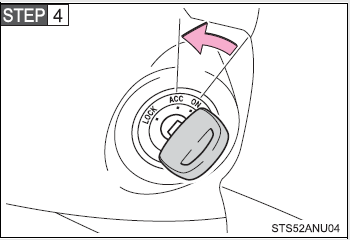 Toyota Yaris: If your vehicle has to be stopped in an emergency
Toyota Yaris: If your vehicle has to be stopped in an emergency
Only in an emergency, such as if it becomes impossible to stop the vehicle in the normal way, stop the vehicle using the following procedure:

Steadily step on the brake pedal with both feet and firmly depress it.
Do not pump the brake pedal repeatedly as this will increase the effort required to slow the vehicle.

Shift the shift lever to N.
If the shift lever is shifted to N

After slowing down, stop the vehicle in a safe place by the road.

Stop the engine.
If the shift lever cannot be shifted to N

Keep depressing the brake pedal with both feet to reduce vehicle speed as much as possible.

Stop the engine by turning the engine switch to the “ACC” position.

Stop the vehicle in a safe place by the road.
CAUTION
■If the engine has to be turned off while driving
●Power assist for the brakes and steering wheel will be lost, making the brake
pedal harder to depress and the steering wheel heavier to turn. Decelerate as much
as possible before turning off the engine.
●Never attempt to remove the key, as doing so will lock the steering wheel.
 If the vehicle becomes stuck
If the vehicle becomes stuck
Carry out the following procedures if the tires spin or the vehicle becomes
stuck in mud, dirt, or snow:
Stop the engine. Set the parking brake and shift the shift lever to P (vehicles
with an ...
 Vehicle specifications
Vehicle specifications
Detailed vehicle information. ...
See also:
If your engine stalls while driving
If your engine stalls while driving...
1. Reduce your speed gradually, keeping a straight line. Move cautiously off
the road to a safe place.
2. Turn on your emergency flashers.
3. Turn the ignit ...
Headlight switch
The headlights can be operated manually.
Turning the end of the lever turns on the lights as follows:
Type A
OFF
Vehicles with daytime running light system: The daytime running lights turn on. ...
Tips for driving in various conditions
- Always slow down in gusty crosswinds.
This will allow you much better control.
- Drive slowly onto curbs and, if possible, at a right angle. Avoid driving onto
high, sharp-edged objects and othe ...
